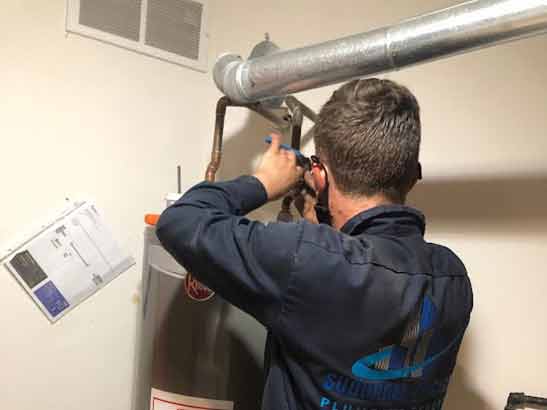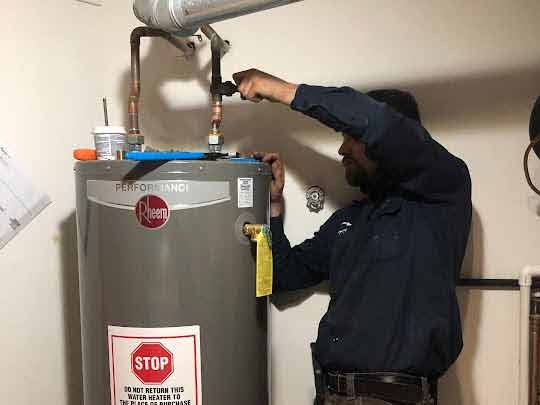
Water heaters are an essential appliance in every household, providing us with hot water for various purposes such as bathing, cooking, and cleaning. However, like any other appliance, water heaters are prone to malfunctions and breakdowns. When faced with a water heater issue, it is essential to understand the common problems and solutions to ensure a quick and efficient repair.
1. How do I know if my water heater needs repair?
There are several signs indicating that your water heater may require repair:
- Lack of hot water
- Inconsistent water temperature
- Strange noises coming from the water heater
- Water leaks around the unit
- Foul-smelling or discolored water
If you notice any of these signs, it is advisable to call a local plumber to prevent further damage or potential hazards.
2. Can I attempt to repair my water heater myself?
While some minor water heater issues can be resolved with DIY methods, it is generally recommended to leave water heater repairs to trained professionals. Water heaters involve complex electrical and plumbing components, which can be dangerous to handle without proper knowledge and experience. Attempting repairs without expertise may not only worsen the problem but also pose a risk to your safety.
3. How much does water heater tank repair cost in Chicago?
The cost of water heater repair in Chicago can vary depending on several factors, including the type and extent of the problem, the brand and model of the water heater, and the service provider you choose. On average, homeowners in Chicago can expect to pay between $150 and $500 for water heater repairs. It is advisable to obtain quotes from multiple professionals to compare prices and ensure a fair deal.
4. Can water heater repairs be covered by insurance?
Whether repairs are covered by insurance depends on the type of insurance policy you have. In some cases, homeowners’ insurance may cover the cost of repairs if the damage is caused by a covered peril, such as a burst pipe emergency. However, it is essential to review your insurance policy or consult with your insurance provider to determine the specific coverage for water heater repairs.

Consulting with a professional plumbing technician can help you make an informed decision based on your specific situation.
5. How long does a hot water heater tank repair take?
The duration of a water heater tank repair can vary depending on the nature of the problem and the availability of replacement parts. In general, minor repairs can be completed within a few hours, while more complex issues may require a day or two to resolve. It is recommended to inquire about the estimated repair time when contacting a professional technician.
6. Should I repair or replace my water heater?
Deciding whether to repair or replace a water heater depends on several factors:
- Age of the water heater: If the water heater is nearing the end of its expected lifespan, replacement may be more cost-effective in the long run.
- Extent of the damage: Minor issues such as a faulty thermostat or heating element can usually be repaired, but significant problems like a leaking tank may warrant replacement.
- Energy efficiency: Older water heaters tend to be less energy efficient compared to newer models, so replacing an outdated water heater can result in long-term energy savings.
- Budget: The cost of repairs should be compared to the cost of a new water heater. If the repair cost is close to or exceeds the price of a replacement, opting for a new unit may be a more economical choice.
Speaking with a professional plumber can help you make an informed decision based on your specific situation.
7. How can I prevent water heater issues in the future?
While some water heater problems are unavoidable, there are preventive measures you can take to minimize the risk of future issues:
- Regular maintenance: Schedule annual maintenance checks with a qualified technician to inspect and clean your water heater.
- Flush the tank: Flushing the tank once or twice a year helps remove sediment buildup, preventing potential damage to the heating elements.
- Monitor water pressure: High water pressure can strain your water heater, leading to leaks or other damages. Install a pressure regulator if necessary.
- Address minor issues promptly: Don’t ignore small signs of trouble. Fixing minor problems early on can prevent them from escalating into major repairs.
By following these preventive measures, you can prolong the lifespan of your water heater and reduce the need for frequent repairs.
To Conclude
Water heater tank repairs in Chicago are a common necessity for homeowners. Understanding the signs of a malfunctioning water heater, the importance of professional repairs, and the factors to consider when deciding between repair and replacement can help you navigate the repair process with confidence. Additionally, taking preventative measures and scheduling regular maintenance can help extend the lifespan of your water heater and minimize the risk of future problems. If you encounter any issues with your water heater, it is advisable to seek the assistance of certified technicians who can provide efficient and reliable repair services.

